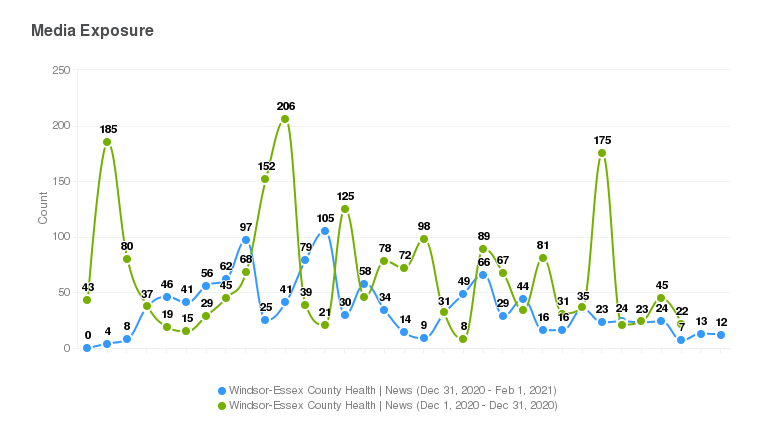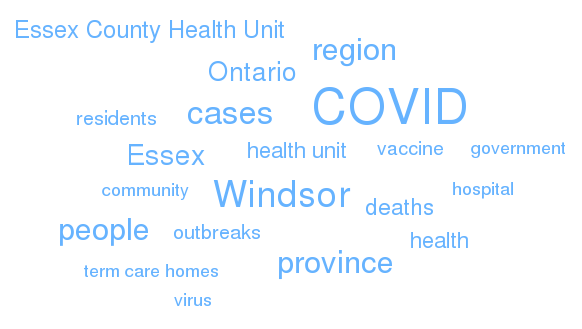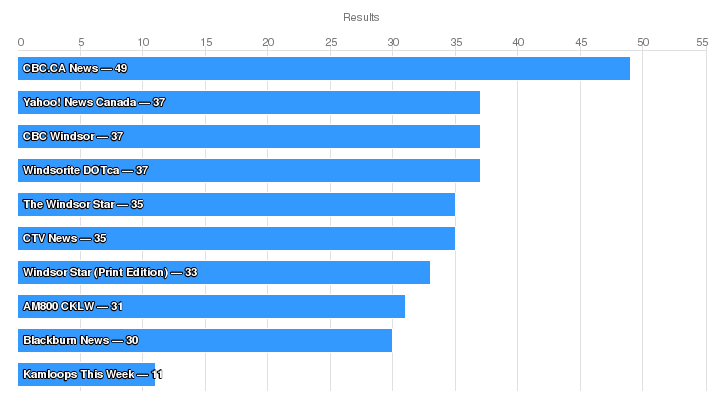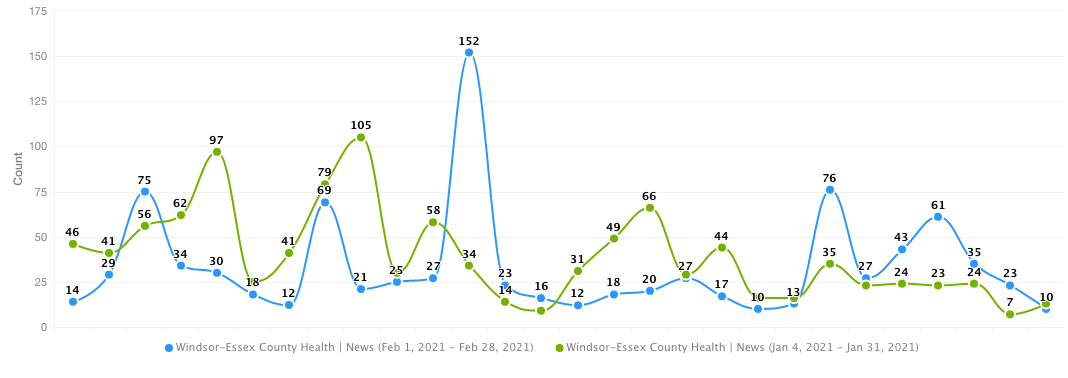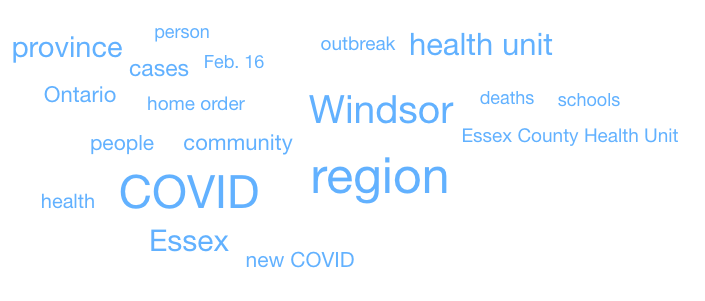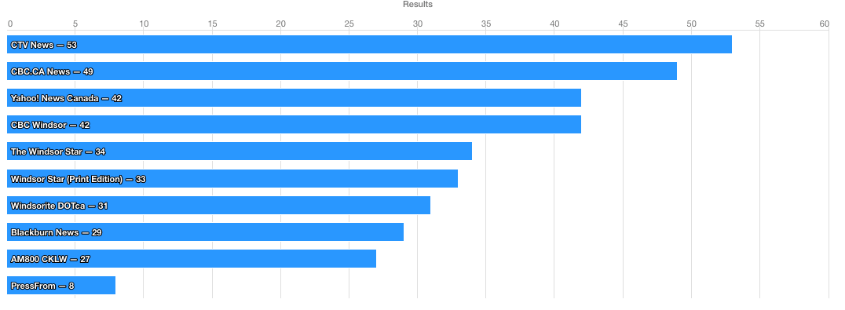Board Members Present:
Gary McNamara, Tracey Bailey, Joe Bachetti, Rino Bortolin, Fabio Costante, Gary Kaschak, Judy Lund, Ed Sleiman, Larry Snively
Administration Present:
Theresa Marentette, Dr. Wajid Ahmed, Lorie Gregg, Nicole Dupuis, Dr. Felicia Lawal, Kristy McBeth, Dan Sibley, Lee Anne Damphouse
QUORUM: Confirmed
- Call to Order
Board Chair, Gary McNamara, called the meeting to order at 4:33 p.m. - Agenda Approval
Moved by: Judy Lund
Seconded by: Rino Bortolin
That the agenda be approved.
CARRIED - Announcement of Conflicts of Interest – None
- Update (Dr. Ahmed)
- COVID-19 Update
Dr. W. Ahmed noted the announcement made by the province today. Today the Premier announced a different pathway to reopen the province, which will occur in three different stages. In stage 1 various sporting activities will open, i.e. golf, tennis, basketball courts, and gatherings of up to 5 people outdoors will be allowed. Following that, more restrictions will be relaxed with gatherings of up to 10 people permitted, possibly in as early as 10 days. In stage 3, in about 21 days, outdoor sports leagues, personal services settings, religious services and gatherings will increase to 25 people. More information will follow.
We are seeing some fluctuations of positive cases in our region, and still have a relatively high number being reported daily. Cases amongst school age children are averaging five cases per day even with the school closure.
Most cases, about three-quarters, are coming from the City of Windsor, followed by the other municipalities. We are seeing most of the cases are occurring within the 0-29 year age group, and we have documented cases of infants less than a year old in our community who have tested positive for COVID-19.
Adults 18+ are now eligible to receive their first dose, and we have seen a decline in cases amongst other age groups that have already been vaccinated. Once vaccination rates increase for the younger age group, we expect to see a drop in cases in younger people. Close contact and community transmission are the biggest contributors.
The Variants of Concern (VOC’s) are a significant driver in our area with more than 70% of our positive cases being VOCs. The VOCs pose a huge risk, as they spread quickly resulting in the daily fluctuation of cases we are seeing in our community.
Hospitalizations are declining in the province as more people get vaccinated, and we are seeing the same result in Intensive Care Units. The older population still has the highest risk and mortality rate.
There have been more than 213,000 doses administered in our region, with approximately 3,600 doses per day through pharmacies and primary care providers. We have immunized as many as 4,800 people in one day. More than two-thirds of doses administered in Windsor-Essex has been Pfizer, with Moderna and AstraZeneca equally making up the rest.
Our overall coverage rate is 48.3% and when looking at just adults, it is 62.6%. Opening up the eligibility to 18+ will help to increase these rates. We are hoping for at least 70% vaccine coverage for further impact and decrease cases in our community.
Various hot spots in our region continue to have the lowest coverage rates at 41%, despite having mass immunization sites and pop-up vaccination clinics in those areas. We are working with the City and the CMHA for a more targeted approach.
G. McNamara said there could be campaigns with community leaders and medical professionals on why you should get the vaccine. This might be a good opportunity to get messaging to the younger population who are also working in essential services, i.e. restaurants and grocery stores. Dr. Ahmed said that we have worked with the University of Windsor around vaccine hesitancy, and our team is looking at all options. N. Dupuis is working with community partners for immigrants through the Multicultural Council as well to work through some language barriers.
E. Sleiman asked if once an individual receives the vaccine are they protected from contracting COVID-19, and if students and teachers are fully vaccinated would they still require a mask when they return to school. Dr. Ahmed said studies have shown that the vaccine protects against severe disease and/or hospitalization from COVID-19. As to whether those have been vaccinated can still contract the disease, we are not sure and there are still many unknowns. Dr. Ahmed said that at some point students and teachers will no longer be required to wear masks when attending school, but for that to happen there will need to be sufficient vaccine coverage rates with very low, to no, transmission in the community.
J. Lund asked if there was any work being done around anti-viral mediation. Dr. Ahmed said that there are many clinical trials happening around the world, but it is likely too early to determine the outcome. We continue to hear that Remdesivir is widely used for COVID patients and it does improve recovery time. Steroids are used as a form of treatment mainly in the UK and has shown some positive benefits in reducing the severity in some cases. There are other medications being used with mixed results and this is still being investigated.
J. Lund asked about the status of allowing Windsorites to receive second doses of the vaccine across the border in Michigan. G. McNamara said that the border is a national responsibility. Some groups are advocating for this along with an exemption of no quarantine when arriving back into Canada but there are still some risks to that. Windsor-Essex has been immunizing approximately 3,000 – 4,000 people a day, and more vaccine is coming. WECHU and our partners have been doing an excellent job and we are moving in the right direction. It might prove to be premature at this time to allow cross-border immunizations.
Dr. Ahmed agreed with G. McNamara that there is a risk to this initiative. Our vaccination coverage rates are almost 63% for those who have received one dose, compared to Detroit at 33%. Our recommendation to the public is still the same, to travel less to reduce transmission. The best option would be to have the extra doses of the vaccine in Michigan brought here, instead of the our residents travelling across the border.
G. McNamara asked where our region is in respect to second doses of AstraZeneca. We have 37,000 residents who have received their first dose, and are we expecting to receive more. Dr. Ahmed said that we are in conversations currently with the province to plan for second doses. The province will offer two options, i.e. to receive a second dose of AstraZeneca, or to mix vaccines and receive Pfizer as the second dose. The product monograph for AstraZeneca ranges from 4-12 weeks and the 12 weeks duration has proven to be more effective. More details will follow once we have more information on these second doses for AstraZeneca recipients.
Moved by: Judy Lund
Seconded by: Ed Sleiman
That the information be received.
CARRIED
- COVID-19 Update
- Approval of Minutes
- Regular Board Meeting: April 15, 2021
Moved by: Joe Bachetti
Seconded by: Rino Bortolin
That the minutes be approved.
CARRIED
- Regular Board Meeting: April 15, 2021
- Business Arising – None
- Consent Agenda
- INFORMATION REPORTS
-
Consumption and Treatment Services Site – Update (T. Marentette)
T. Marentette said that we are moving forward in the Consumption and Treatment Services Site selection process. You will likely hear more about community consultation in July around the sites proposed. All of our consultations will be virtual and we want to ensure that it is inclusive by engaging stakeholders, businesses, neighbours, the BIA and municipal councillors applicable in the area. We are working with our legal representative before any lease is signed, background work is in progress, and we are not comitting to anything until the funding has been secured. More information will be forthcoming. -
Beach Water Sampling (N. Dupuis)
To be brought to the Board for information. -
Vector-Borne Surveillance Report (N. Dupuis)
To be brought to the Board for information. -
Syphillis and HIV in Windsor-Essex County (F. Lawal)
G. McNamara said that the increasing numbers of infection for Syphillis and HIV from 2017-2019 in our region is concerning, and are higher than the provincial average. F. Lawal said the WECHU is seeing as many as 4 cases of Syphilis a week in our sexual health clinic and the trend definitely is concerning. We are working hard to create public awareness around the seriousness of contracting these diseases and the impact on health, i.e. vision, demensia, and the congenital piece, and it remains imperative that we continue to identify contacts for infectious diseases druring the pandemic. -
March and April Communications Recap
To be brought to the Board for information.
Moved by: Judy Lund
Seconded by: Ed Sleiman
That the above information be received.
CARRIED
-
- RECOMMENDATION REPORTS
-
Healthy Babies Healthy Children (N. Dupuis/L. Gregg)
N. Dupuis noted that the Healthy Babies Healthy Children (HBHC) program is a mandated program under the Ontario Public Health Standards (OPHS), and is funded 100% through the Ministry of Children Community and Social Services (MCCSS). In 2020, due to the COVID-19 pandemic, HBHC program services were significantly altered across the province as staffing resources were redeployed to support the COVID response.In March 2021, the WECHU received communication from the MCCSS requesting the restoration of HBHC services for the 2021-2022 fiscal year. Health Units were asked to submit their service delivery plans and financial forecast to MCCSS by April 14, 2021 for review and consideration. Where staff were redeployed to other services supporting the pandemic, health units were asked to consider alternative staffing models including the use of social workers and other professional staff to support program delivery and identified service goals.
L. Gregg advised that the budget for this program for this year is $2,894,841, and is a combination of the HBHC and Nurse Practitioner program previously reported under separate funding. The Operating Budget has some notable changes. Professional development costs increased to address the needs of FTEs that are new to the program.
There was an increase in program supplies of $66,159 for the Healthy Babies Healthy Children Program Initiative to address the need to review and refresh resources and revitalize the program. Additionally, there will be an augment in information technology hardware and software to address increased FTEs. The program area will also continue to review equipment requirements for work-from-home as well as ensuring field staff are more mobile, in that they can document client interactions in the field.
Therefore, we are requesting that the Board approve the budget for this program of $2,894,841 as presented by Administration for the period April 1, 2021 to March 31, 2022.
Moved by: Judy Lund
Seconded by: Rino Bortolin
That the Board approve the Budget as presented by Administration.
CARRIED
-
- INFORMATION REPORTS
- New Business
-
Fluoride Update (W. Ahmed)
Dr. W. Ahmed said that we recently received communication from Enwin regarding fluoride introduction into the WUC water system. The process has been delayed due to the pandemic but despite these delays, Enwin management is expecting the project to reintroduce fluoride to the drinking water to be accomplished within the allocated budget for 2021.
Moved by: Larry Snively
Seconded by: Ed Sleiman
That the above information be received.
CARRIED
-
- Other Board of Health Resolutions/Letters
-
Brian Masse, MPP, Windsor-West – Letter to Windsor-Essex County Health Unit – Vaccination for CBSA Officers at International Borders
-
Peterborough Public Health – Letter to Honourable Doug Ford – Stay at Home Order Extended to June 2, 2021
-
Municipality of Lakeshore – Letter to Honourable Doug Ford – Boat Launches to be open in Ontario
Moved by: Judy Lund
Seconded by: Ed Sleiman
That the information be received.
CARRIED
-
- Committee of the Whole (CLOSED SESSION, in accordance with Section 239 of the Municipal Act)
The Board moved into Committee of the Whole at 5:30pm
The Board moved out of Committee of the Whole at 5:50 pm - Next Meeting: At the Call of the Chair, or June 17, 2021 – Via Video
- Adjournment
Moved by: Judy Lund
Seconded by: Gary Kaschak
That the meeting be adjourned.
CARRIEDThe meeting adjourned at 5:50 pm.
RECORDING SECRETARY:
SUBMITTED BY:
APPROVED BY:


